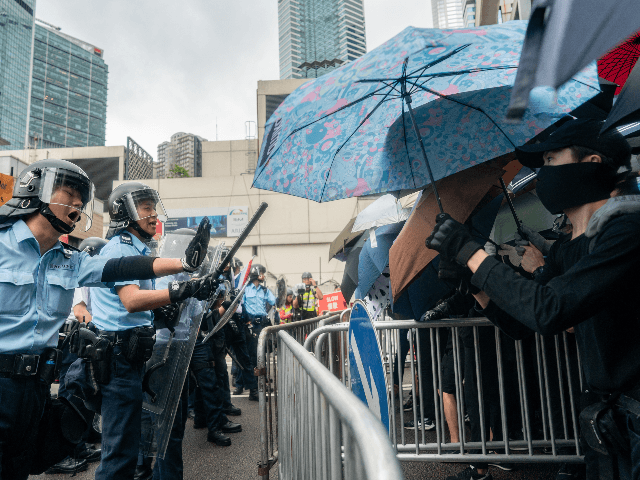China’s Global Times newspaper defended the pro-Communist leadership of Hong Kong’s decision to use tear gas and rubber bullets on pro-democracy protesters Wednesday, insisting that the thousands of mostly young students opposing a law that would allow their extradition into the mainland were “violent” extremists radicalized by the United States.
Hong Kong’s legislature is currently considering a bill that would allow the extradition of its citizens to the Communist Party-controlled mainland if they are indicted for crimes in China. The bill has triggered tremendous controversy and driven the legislature to blows on at least one occasion. China’s communist law prohibits a wide variety of individual activity that falls under internationally recognized rights of self-determination, including worship outside of the Chinese-controlled religious organizations and nearly all forms of political dissent.
Many protesters expressed concern that the law would result in their extradition and imprisonment if they criticized the government in public in Hong Kong, where China nominally agreed to allow autonomy following Britain’s withdrawal. China and Hong Kong agreed to co-exist under what China calls “One Country, Two Systems,” an arrangement that allows Hong Kong to continue its capitalist traditions but makes China sovereign over it. China has consistently pushed the limits of “One Country, Two Systems,” allowing business to continue in Hong Kong while attempting to curb individual rights of expression and making Hong Kong politicians beholden to Chinese interests.
The Global Times, which often acts as a mouthpiece for the Chinese government, claimed the outsized protests in Hong Kong this week were the product of “powerful interference from foreign forces, especially the US,” and that “locals” were growing concerned that the protesters would harm the “stability” of the administrative region.
Referring to the protests on Wednesday, in which police attacked protesters, the Global Times said, “the violent incident has brought heavy criticism from different groups in Hong Kong, since this has seriously harmed the stability and prosperity of the city.” It quoted several alleged “locals” who claimed that American misdirection had inspired the protests. One claimed that “the vast majority” of the protesters who support the extradition law “if they knew what it’s really about.” Another called support for the protests “very irresponsible.”
“Experts noted that without the interference from foreign forces, especially the US, the opposition groups and extreme Hong Kong separatists would not have been able to launch such a serious attack,” the article claimed.
One “expert,” a Beijing professor, claimed the protests were tied to the ongoing trade dispute between China and the United States. “Due to the worsening China-US ties and escalating trade war, the US is using its influence to make trouble for China, and this will damage China’s national interests,” the professor alleged.
Another pro-China voice, the principal of the Hong Kong College of Technology, is quoted as warning, “Hong Kong’s future would be finished if their misdoings are not restrained.”
In a separate article Wednesday, the Times made the emphatic argument that China had no interest in challenging Hong Kong’s capitalism.
“Is there anyone on the Chinese mainland who wishes Hong Kong lose its capitalist character and become more like a mainland city?” the article asked. “It cannot be said there is no one who so desires. But it is definitely not the mainstream view on the mainland and it is well-nigh impossible that it would become a policy of the Chinese central government.”
“Most people on the mainland hope Hong Kong will stick to the ‘one country, two systems’ policy, maintain its unique social landscape based on capitalism, because that is what makes Hong Kong interesting and worthy of visiting,” the piece claimed.
Notably, the Global Times did not mention Hong Kong’s traditions of free speech and democratic governance, which are the issues protesters believe the extradition law challenges, but “capitalism,” or the existence of private industries that can enrich China.
That article also warns that “political confrontation” is a hallmark of Western free societies, but that, in the Global Times’ estimation, the system does not work outside of the West. “In non-Western societies, political confrontation often goes to extremes and hits a dead-end, affecting social governance mechanisms and even leading to tragedies. Hong Kong must not learn from them,” the piece claims.
The Global Times, in blaming the United States for inspiring the protesters, echoed remarks by Chinese Foreign Ministry spokesman Geng Shuang, who on Tuesday responded to a question about the Hong Kong extradition law by insisting, “Hong Kong affairs are purely China’s internal affairs. No other country, organization or individual has the right to interfere”
“China deplores and firmly opposes the irresponsible and erroneous comments on the amendments and other Hong Kong affairs made by the US side. We urge the US to view the relevant amendments in a fair and just manner, exercise caution in its words and deeds, and stop in whatever form interfering in Hong Kong affairs and China’s domestic affairs,” Geng said, referring to comments by American officials opposition an end to “one country, two systems.”
Wednesday’s protests followed a massive street manifestation on Sunday that organizers say attracted over 1 million people. Those ended peacefully, but Wednesday’s resulted in police firing tear gas canisters and rubber bullets at protesters approaching the legislature and blocking major roads. Police also used batons to beat protesters.

COMMENTS
Please let us know if you're having issues with commenting.